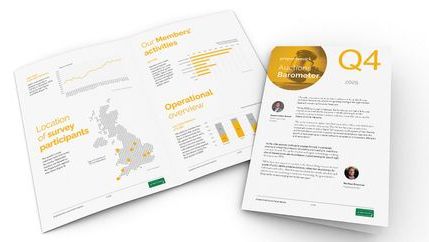
Landlord responsibilities
With responsibilities for landlords increasing, costs to meet these responsibilities — such as additional homes surcharge across each of the UK nations’ land transactions systems — are also mounting which could be leading to many landlords selling their properties or diversifying into the short-term lets sector.
Avoiding over-regulation across the UK should be a priority to keep existing landlords in the sector as well as attract new buy-to-let investment.
Propertymark has consistently called for the enforcement of existing rules, which we believe should be the main focus for governments to target rogue landlords rather than adding more red tape that may alienate those who try their hardest to comply/ have an interest in joining the sector.
We have also called for greater regulation of the private rented sector in Northern Ireland, as shown by our recent response to the Assembly’s Call for Evidence, in which we also urge caution against the introduction of too many regulatory changes at once because this could result in landlords leaving the sector.
In our representation to HM Treasury, we proposed that the UK Government develop a private renting sustainment and support programme to help prevent further debt, poverty and homelessness, and to help enhance access to affordable housing for households displaced as a result of COVID-19.
Since lockdown, renters and landlords whose finances have been affected cannot keep tenancies going without additional financial support. The £65 million funding for those in rental debt (England) provides some support, however almost four million low-income households across the UK are in arrears with their household bills, yet this money will be targeted at those who are most at risk of homelessness, excluding a significant number of others from help.
A programme of support would ensure Local Housing Allowance rates and Universal Credit are adequate and more effective so that landlords and letting agents would have more confidence to offer tenancies to claimants. Local councils would also be given adequate funding to drive up standards through enforcement.
Housing courts
The present route to possession via the courts for private landlords is slow, complex, and costly and with the UK Government’s Renters’ Reforms agenda on the horizon, the Chancellor had the perfect opportunity in the Spending Review to ensure there is a court system that can ensure faster access to justice for both landlords and help to safeguard the supply and quality of housing via enhanced confidence in the justice system.
Additionally, Propertymark has supported calls for the development of a specialist housing tribunal in Wales, similar to what has been introduced in Scotland. The implementation of a specialist housing tribunal in Wales could help prevent many more landlords from leaving the sector – particularly those who own a single property – which may mean higher rents and further pressure on social housing providers and local councils due to lack of supply.
Energy efficiency
For many landlords across the UK, the planned changes to energy efficiency rules may potentially lead to further costs that may be unsustainable for their current incomes, risking further landlords to leave the PRS.
Propertymark has long called for decision-makers across the UK to move away from a one-size-fits-all policy and develop energy efficiency proposals that work with the different ages, conditions, and sizes of properties. This way each of the governments across the UK can target grants and funding support based on the characteristics of a property rather than its tenure.
In particular, the UK Government must continue to invest in the Green Homes Grant Voucher Scheme or introduce a suitable alternative to help landlords and homeowners improve the energy efficiency of their properties, cut their carbon footprint, and reduce household energy bills.
Are you Propertymark Protected?

Letting agents can value the potential rental yield for your property, undertake referencing, tenancy agreements, deposit protection, maintenance, inventories and ensure you're compliant with the law. By using one of our members you are guaranteed to be consulting with a professional agent who will give you up-to-date advice and guidance.
Chancellor focuses on economic stability in Spring Statement
Whilst nothing significant was delivered defining housing policy, the statement set the tone for future decisions. Yet, without sustained, targeted support for housing, the underlying pressures in the property market will remain. Transactions depend on confidence, investment depends on stability, and supply depends on a coherent long-term strategy.
Regulation of agents must be part of the solution to issues with Decent Homes Standard
The evidence that underpins the policy has been criticised by the Regulatory Policy Committee as not fit for purpose, with concerns raised about whether it can genuinely drive improvements in housing quality across the private rented sector (PRS). As the UK Government considers extending and reforming the DHS, it is vital that policymakers recognise a simple truth: standards alone will not improve homes unless they are enforceable, understood and supported by a professional, regulated sector.
Auctions Barometer: Q4 2025
The Q4 2025 Auctions Barometer reveals a sector gaining confidence as base rates ease and digital innovation accelerates. With rising lot numbers, strong reserve price performance, and online formats leading the way, the report highlights how auctioneers are adapting to economic shifts while continuing to deliver results for buyers and sellers across the UK.
Renters’ Rights Act: practical steps for letting agents to take now
With two months to go until the first changes take effect, letting agents should now be focused on operational readiness. Continuing our support for members, our latest webinar in a long series addressed the issues most frequently raised by agents. These included written information requirements, payment processes, rent increases, possession grounds and internal systems. With early planning, clear documentation and robust processes, agents can approach 1 May 2026 with confidence.
Commercial Outlook Q4 2025
Latest insights reveal the sector is showing growing resilience, with easing inflation, a lower base rate, and rising rents helping to rebuild confidence despite ongoing structural challenges. Shifting consumer behaviour, targeted regeneration, and smarter use of data and technology are set to define the next phase of commercial property growth.
Silver surge: what’s driving a rise in older homebuyers?
New analysis of a decade of homemover data shows that buyers aged 50 – 59 are now the fastest-growing segment of the UK housing market. The findings highlight a significant shift in market activity that agents should factor into their business planning and service offerings. The growth of the older buyer group does not signal a decline in other segments. However, it does underline the importance of understanding who is driving transactions at any given time.









